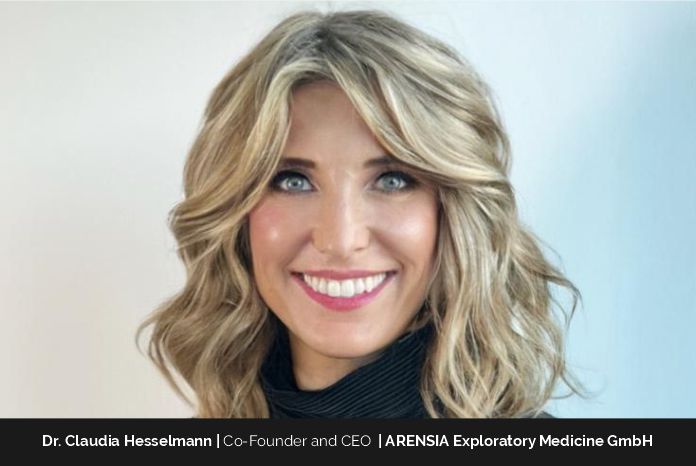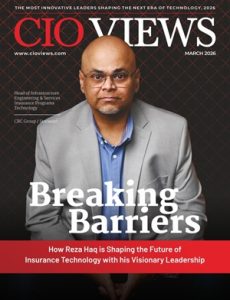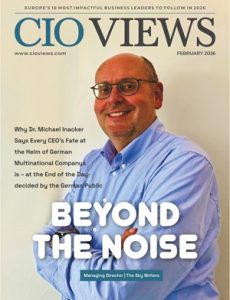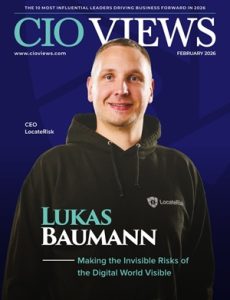Game Changing the Paradigm of Clinical Trials: Where Every Day Counts for Patients in Need!
“Make yourself useful!” It was more than advice from her father; it became a way of life. Growing up in communist Romania, she saw what it meant to live under control and censorship. In the 1990s, she had experienced the raw energy of capitalism breaking through. Few leaders experience both worlds so directly. It gave her tenacity and the instinct to spot opportunity where others saw only obstacles.
Her father’s example of courage and compassion, even in the harshest conditions, left a permanent mark. Later, watching him fight lung cancer with the help of modern therapies showed the power of medicine not in theory but in real lives extended.
That experience drives her mission today at ARENSIA. For Dr. Claudia Hesselmann, Founder and CEO, ARENSIA Exploratory Medicine GmbH, research is not about statistics. She considers it an empowering tool that accelerates access to treatments, so patients don’t wait in vain. Efficiency, integrity, and speed aren’t business strategies. They are moral imperatives. Read through this cover story on Claudia, who has secured the coveted spot among the top 10 most innovative CEOs making a difference in 2025.
What personal values or experiences inspired you to start ARENSIA and pursue innovation in medicine?
My childhood profoundly shaped who I am. Growing up in communist Romania in the 1980s and then witnessing the shift to capitalism in the 1990s, I lived through two completely opposite worlds. The contrast was stark: total censorship versus freedom of expression, rigid state control versus the energy of a free market bursting with new possibilities. Experiencing both extremes taught me resilience, gratitude, and the ability to see opportunity even in hardship.
The greatest influence in my life was my father. He was a man of extraordinary empathy and strength who, during the 1970s and 1980s, managed the largest metallurgical factory in Romania – one of the biggest in the entire Eastern Bloc. In one of the harshest communist regimes, where a single careless sentence could mean imprisonment, he dared to live by his motto: “Make yourself useful!” He fought for people, for fairness, and for progress, never for himself. His love for others, his determination to achieve the impossible, and his courage to lead with compassion left a lasting mark on me. Later, watching him bravely fight lung cancer for nearly a decade – his life prolonged thanks to modern diagnostics and therapies – was proof of how profoundly medicine can change the course of a life.
After completing my master’s degree in chemical engineering and relocating to Germany after graduation, I began my career in clinical research at the country’s largest private Phase I clinic. There, I faced a painful truth: in the earliest phases of drug development, enormous amounts of time and resources were being lost. And with every delay, patients continued to wait – suffer – without access to potentially life-changing treatments.
This was unacceptable to me. I knew something had to change. That conviction became the driving force behind creating a company that would challenge the status quo and reimagine how clinical trials are conducted.
This is the story of how ARENSIA was born: driven by a commitment to addressing underserved areas in clinical research and the belief that research can be faster, smarter, and always centered on patients. Since its inception, ARENSIA has grown into an international organization with a presence in eight countries, operating 15 research clinics and employing over 800 extraordinary and passionate clinical research professionals. The core values that have inspired me from the beginning—integrity, agility, speed, and impact—remain the heartbeat of our company today.
How do you manage your daily responsibilities as CEO while staying connected to the company’s core mission?
I prioritize by asking myself constantly: Does this action bring us closer to accelerating innovation? That lens helps me delegate effectively, focus on strategic decisions, and remain connected to our mission. I also spend time with our incredible teams and clients to stay attuned to the ground reality.
What steps have you taken to build a culture of innovation within ARENSIA?
From the very beginning, we built ARENSIA to be lean and independent, free from unnecessary bureaucracy. Innovation thrives in such an environment. I encourage experimentation, open dialogue, and cross-disciplinary collaboration. I urge my teams never to accept ‘no’ as the final answer – because every challenge has a solution. When problems arise, we don’t stop at identifying them; we take responsibility and bring solutions to our pharmaceutical partners. We also treat failures as opportunities to learn and grow. By empowering people with ownership and trust, we’ve created a culture where innovative solutions emerge naturally and continuously.
Can you describe a major challenge you faced as a founder and how it shaped your leadership?
As a founder, two major crises profoundly shaped my leadership. The first was the outbreak of COVID-19. While clinics and hospitals around the world closed their doors to research, forcing patients out of ongoing protocols, we chose a different path. Instead of retreating, we immediately put a pragmatic business continuity plan in place and followed it through with determination. This not only allowed us to protect our staff and patients and keep research going, but also to grow. In fact, we became one of the very few companies in our industry whose facilities remained fully operational – and even thrived – throughout the pandemic. That moment tested our resilience and proved that with courage and clarity, we could rise above fear and uncertainty.
The second great challenge came with the Russian invasion of Ukraine, home to one of our largest research clinics in Kyiv. Overnight, life was turned upside down. While many businesses shut down, we made a different choice – we stood firmly by our team, whose resilience in the face of fear and uncertainty inspires me to this day. Together, we worked to create the safest possible conditions so patients could continue their trials – often their only hope for survival. Against all odds, we never stopped a single project. On the contrary, we showed our pharmaceutical partners that Kyiv remains a place of trust, reliability, and excellence in clinical research. We even earned the privilege of new projects, further strengthening our belief that perseverance always prevails. Most importantly, we kept the doors open for underserved Ukrainian patients, giving them access to groundbreaking therapies at a time when hope itself felt under siege.
Both crises reinforced my belief that true leadership is about persistence, transparency, honesty, and above all, an unwavering focus on people – patients and staff alike. They deepened my conviction that leadership means holding steady when others doubt, finding strength where others see only obstacles, and serving people, especially when it matters most.
How do you maintain balance between your professional role and personal life?
Maintaining balance is not about drawing a strict line between work and personal life but about creating alignment between the two. My passion for ARENSIA’s mission is a constant source of motivation, while my three children keep me grounded and remind me of what truly matters. Sports have always been an essential part of my life – whether through daily routines like Pilates and strength training or through activities I enjoy with family and friends, such as skiing, tennis, and swimming. Beyond that, I also find joy and inspiration in painting, interior design, cinema and reading. Altogether, these elements create harmony between my professional role and personal life.
What does success mean to you as a leader in the pharmaceutical research space?
For me, success is not measured in numbers, but in lives touched. It means helping patients access new treatments sooner – because for them, every single day counts. What I find most disheartening in our industry is the bureaucracy and lack of urgency that often dominate large pharmaceutical companies and CROs. The disconnect between departments creates artificial delays at every stage of a trial, while a lack of ownership and initiative prevents new strategies and geographies from being explored. There’s a well-known quote that fits perfectly here: ‘Insanity is doing the same thing over and over again and expecting different results.’ After 25 years in this field, I can confidently say that clinical trials could be conducted with at least 50% less time and cost than what has become the industry norm.
At ARENSIA, we demonstrate this every day. With 15 dedicated research clinics across 8 countries, we cut through bureaucratic hurdles and, thanks to our focused infrastructure, achieve patient enrolment rates up to 20 times faster than traditional models. When people ask what makes us so disruptively different, the answer is simple: total focus on results. We meticulously own and organize every resource involved in trial conduct, eliminating all unnecessary steps.
I often compare ARENSIA to a Formula 1 team – success depends on perfect synchronization, precision, and flawless teamwork. The fastest F1 pit stop to change four tyres is just 1.8 seconds – while in the ‘traditional’ industry model, changing the same four tyres would take 30 minutes to an hour. That’s the difference between standing still and truly accelerating progress for patients.
How do you approach collaboration across global teams and partners to drive progress?
At ARENSIA, collaboration begins with relationships built on trust, honesty, and transparency. For us, it’s never about short-term gains but about creating long-term, win-win partnerships. Technology keeps us connected across geographies, but what truly makes collaboration effective is empathy, active listening, and genuine respect.
I always encourage my teams to pick up the phone and speak directly with their counterparts when issues arise, instead of hiding behind endless email chains. We push each other to find solutions rather than settling for the standard ‘we’ll get back to you’ response. In the end, problems are created and solved by people, not systems – and that means effective, human interaction is the key to driving progress together.
Which achievement in your career stands out as most meaningful, and why?
The achievement that stands out to me the most is opening our research clinics in emerging geographies and demonstrating that world-class early-phase research can thrive beyond traditional hubs. What moves me deeply is not just changing industry perceptions but knowing that patients -many of whom would otherwise never have had the chance – can now access innovative therapies through clinical trials that may transform their lives.
There is no greater reward than moments like seeing a patient arrive at our clinic with a prognosis of only six months to live and then meeting that same patient six years later – still alive, thanks to a novel therapy received in one of our trials. For me, nothing defines success more clearly than that.
How do you hope your work will influence future generations in medical research and entrepreneurship?
I hope my work proves that independence, courage, and integrity can walk hand in hand with scientific excellence. More than anything, I want future generations of entrepreneurs to believe that they can challenge conventions, remain true to their values, and still build organizations that truly change lives. If this inspires even a few to dream boldly and act with integrity, then I will know we have left a legacy that matters.
What advice would you give to emerging leaders aiming to innovate in complex industries like yours?
Be bold, be flexible, and above all, be persistent! Don’t be afraid to challenge conventions, but also learn when patience is necessary – because in complex industries, real change takes time. Focus on building credibility step by step and surround yourself with people who are not only talented but also passionate. Don’t limit yourself to experience alone; look for smart, curious, and creative minds. They will adapt, learn, and thrive – and together, you can achieve what once seemed impossible.
How do you stay ahead of trends and developments in science and technology?
I try to stay ahead by never stopping learning – whether it’s reading, joining conferences, talking to thought leaders, or simply listening to our own teams. For me, curiosity isn’t optional; it’s a daily habit. It’s what keeps me inspired and ready for whatever science and technology bring next.
What leadership traits do you believe are essential for ethical and impactful innovation?
Integrity is non-negotiable. Alongside it, vision, persistence, empathy, and the courage to challenge the status quo are essential traits for any leader. Innovation without ethics can be dangerous, while ethics without innovation leads to stagnation. True progress happens only when both walk hand in hand.
What legacy do you hope to leave through your work at ARENSIA and your role as CEO?
I hope to leave behind an organization that has set a new gold standard for how clinical trials are conducted at the site level – faster, more efficient, and always centered on patients. My vision is that ARENSIA will continue to accelerate drug development long after I’m gone, driven by a culture that proves bold ideas can become reality. The legacy I aspire to is one of integrity, impact, and inspiration.
Great leaders know legacy is built in moments of crisis. When clinics shut down during the pandemic, she kept ARENSIA open. When war threatened her team in Kyiv, she stood by them. Those choices defined not just survival, but trust.
The work continues with the same conviction: to deliver innovation at speed while keeping integrity intact. Her ambition extends far beyond personal recognition; it has redefined how research and leadership can be approached with authenticity. By challenging conventional methods, she has shown that groundbreaking results can be achieved without compromising values. Her journey demonstrates that true leadership is not only about boldness and persistence, but also about balancing those qualities with compassion, empathy, and responsibility. If tomorrow’s entrepreneurs take one lesson from her path, it is that success built on integrity and care creates impact that lasts far longer than any accolade.





